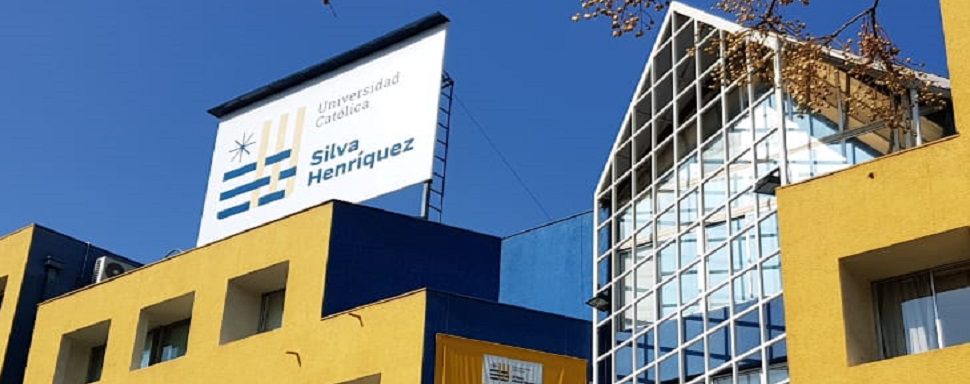(Universidad Católica Silva Henríquez, Santiago de Chile) – In the Global Educational Pact framework, Fr. Claudio Cartes, Youth Pastoral Delegate of the Salesian Congregation, and the Executive Secretary of the Cardinal Raúl Silva Henriquez Foundation, Nello Gargiullo, manifest a text regarding the central ideas of the message declared by Pope Francis around education.
1. The center of all formal and informal educational processes should be the person, their value, their dignity. Placing its specificity, its beauty, its uniqueness, and at the same time, its ability to relate to others and with the reality that surrounds it, rejecting lifestyles that favor the spread of the culture of waste, disposal, and exclusion.
2. Listen to the voices of children and young people to whom we transmit values and knowledge, and from whose interior new energy originates, to build together a future of justice and peace, a dignified life for each person.
3. Encourage the full participation of girls and female education, as well as of all women in society.
4. Empower families as the first and vital educators.
5. Educate all and educate ourselves to welcome, opening ourselves to the most vulnerable and marginalized.
6. Commit ourselves to study to find other ways of understanding the economy, politics, growth, and progress so that they are indeed at the service of people and the entire human family from the perspective of integral ecology, without being left behind in their autonomy.
7. Safeguarding and cultivating our world, protecting it from exploiting its resources, adopting more sober lifestyles, and seeking the integral use of renewable energies that respect the human and natural environment, following the principles of subsidiarity and solidarity and of the circular economy.
These are seven ideas of the Global Educational Pact assembled in 2019 – which should have taken place on May 15 – and which forces us to rethink the meaning and urgency of launching this process presented as a true way to rebuild a vision integral to education worldwide.
On October 15, the feast of Saint Teresa of Avila, doctor of the Church, in a video message, Pope Francis launched the central ideas of this pact, proposing to all countries to prepare for the great face-to-face ceremony, to be done when the circumstances allow.
Cardinal Silva’s dream of Chile: a starting point
It is a very inspiring proposal for our country and an opportunity to rescue Cardinal Raúl Silva Henriquez’s commitment. To make the Dream of Chile come true (Nov. 1991), to build a common commitment that requires the unity of the important Chilean Society sectors, precisely when the opportunity to give life to a Constitutional Charter is near. A chance for expression of a reality that changes and demands to give importance to every human person’s dignity, to work, to justice, to peaceful coexistence; stimuli of an economy with the flavor of greater opportunities for good jobs and personal initiatives for young entrepreneurs.
The temperance that prevails over adversity.
The harmonic bases for a healthy coexistence can be thought of with small daily pacts, and from there, towards collaboration and search for inclusion horizons of all sectors of society. The idea that we have of “being builders of the Society”, which has often circulated also in our circles of the Catholic intelligentsia, requires continually opening up to the most neglected and lagging sectors, beyond some assistance expressions. Today, we are all required to work in a network and collaborative integration, where the more affluent sectors of our society —not only materially but culturally and intellectually, can contribute with a constant commitment to openness with the contributions they make. Today, there is no economy that resists, there is no type of rationality that can be sustained without human wealth forged by all, with sacrifice and temperance in the midst of adversity, not only the last, as they are causing this pandemic, but the constant adversities that life presents us
Without populisms and integrity
There are significant ferments, from various social edges, that invoke the vitality and energy of the Catholic world to put aside any form of fundamentalism, be it religiously or culturally, and likewise, any tendency to reduce the Gospel message by separating it from social changes. On the other hand, there are also tendencies of the culture, increasingly secular, to proclaim forms and promises of populism lacking in successes of continuity and permanence in time, when certain socio-political change programs that are only proclaimed from an exclusive and exclusive trench politics, whose visions of the human being and that of society are not perceived as focused on the global common wellbeing.
A pact to overcome discouragements
As expressions of Christian-Catholic environments, convinced of the complexity of the problems that are experienced, the first thing that must be projected as a pact, is to stay away from discouragement and hopelessness, rather, seeking, with varying degrees of confidence, ways to share positions and integration bridges from those sectors of culture that live the same concern for peace and justice. To address these concerns, Christian culture must divest itself — with humility — of the same conviction that it holds truths and solutions in its hands as if they were objects. In other words, that essential element of any form of dialogue must be put in place, including active listening and being at the service of the truth that occurs in this story.
Education as a denied right of millions of boys, girls, adolescents and young people.
A new culture is born on the centrality of people, which is well cultivated and transformed into life projects. Education is the instrument that gathers strength to favor the flourishing of life projects. A right, to which 250 million children in the world still cannot access. Absent education is a denied right that, in general, is also associated with the lack of a smile on the face of so many children, adolescents and young people. The same families also run the risk of not teaching them these vital expressions due to the many and varied difficulties they go through. The concern for survival, many times, overshadows the necessary and existential journey of the wishes and dreams that emerge in each person from childhood.
What should we do?
The ongoing pandemic has reduced the circulation of many of us as people and of so many essential goods, which has led us to think, meditate and, perhaps, among the many questions that arise, we can integrate this social relationship to become part of the Global Compact for Education: What can I and what should I do? What should I do today, to face the future?
Milk and honey were signs of abundance in times past. They are produced fruitfully when the necessary conditions are in place. Food, mobility, good air, and pollen facilitate fertilization, which, finally, translates into energy value for the bio-diversity itself. We no longer think so much of an “I” or it should not be, but we, as a whole, allow us to face the challenges to generate conditions for the possibility of fertility.
A preventive pedagogy for diversity and unity.
The book of Deuteronomy has much to teach us as part of the Salvation history process. This path requires unity in diversity and enjoying the goods of the earth, which were milk and honey in abundance and the species with which one learns to highlight the flavors of the earth’s products. For this, education and pedagogy were also needed. Today, there are many more assets, but they become scarce when creating brotherhood, and human co-responsibility is not available. This is one of the tasks of Education with all its diversity. It does not finish fulfilling its function until the last boy, girl, adolescent and young person has the milk and honey necessary to sustain themselves and the necessary tools so that in their face the smile is born or returned and in your hands are those conditions of possibility to develop their skills.
Educate reciprocity.
Only Education will combine the keys to a new harmony of the universe, a new relationality, which will require strength from us to move forward after the unfortunate traces that this pandemic will leave. Furthermore, with the advances in technology, which gives greater possibility to have opportunities-, a higher cost will also be associated with access to advanced media. These require redoubling public policy efforts and those who have more, to provide the necessary means and, above all, to promote a diverse climate and pedagogy of unity.
To defeat the new poverties and consolidate democracies.
We are facing a great challenge of the global educational pact, both to defeat poverty and to strengthen democracy, even in societies like ours that come from an exemplary experience to reduce extreme poverty, but that, continually run the risk of regressing if the challenges that are revealed to us are not assumed. Today, in complex societies, new needs emerge that were not considered a few decades ago as a condition of poverty. Only an education thought globally and communally can ensure progress according to requirements.
The global educational pact suits Chile well. It is good to think about how to implement it so that milk and honey – as symbols of abundance – are a horizon of development and progress that, by itself, has proven insufficient to achieve it. In other words, autonomous progress, only technoscientific development, is ineffective in ensuring what matters to the human being as a whole.
Read the vital signs of the town.
Each town has its wisdom. The Chilean people also have theirs: popular sayings guide and give meaning to everyday life. There are also prominent figures who have interpreted the people’s feelings and with their actions and words, they have something to say, especially when walking becomes difficult. It is the moment to look at and resort to them when the perspective of cultural and structural changes is necessary to give a new dynamism to the country’s life.
In Don Raúl’s dream of Chile, there are seeds of wisdom to reread, rethink, update, and feed the Global Pact for Education implementation.
Posted by: Jenny Díaz Hernández


